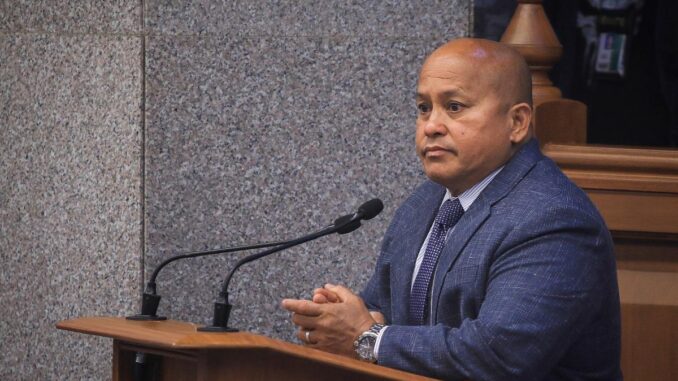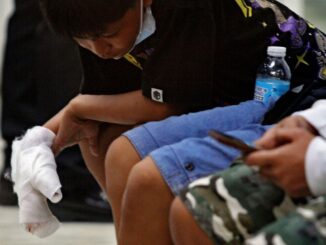
Senator Ronald “Bato” dela Rosa on Wednesday questioned the memorandum of agreement (MOA) among the Philippine Health Insurance Corporation (PhilHealth), Development Bank of the Philippines, and Tingog Partylist for the Rural Financing Health Development Program.
In a privilege speech, Dela Rosa asked why the Department of Health (DOH) is not involved in the program, noting that it is the government agency that is in charge of all programs related to health infrastructure and development.
The lawmaker also stressed that the Health Department has the mandate to provide technical assistance, consultation, and advisory services to stakeholders regarding health facilities regulation.
“Kaya naman, nakapagtataka para sa akin, bakit kaya hindi naisama ang DOH sa isang programa na sa ating pagtingin ay bahagi o nauugnay sa mandato nito?” he asked.
“Bakit kaya mas pinili ng DBP at Philhealth na makasama sa kanilang MOA ang isang partylist kaysa sa Department of Health? Gusto ko rin pong malinawan,” he went on.
(That is why I am curious, why was the DOH not included in a program that in my opinion it should be part of or a part of its mandate.
Why did the DBP and Philhealth instead choose a partylist instead of the DOH? I want to be clear on the matter.)
Dela Rosa also questioned why the DBP and PhilHealth did not choose the Department of the Interior and Local Government in pursuing this program.
“Ang tanong ng lahat sa kasunduan na pinirmahan ng PhilHealth, DBP, at Tingog Partylist: Legal ba ito? Ethical ba ito? Hinaluan at hahaluan ba ng politika ang mga programang pangkalusugan? Masasabi ba natin na ito’y purong etikal at legal, at walang halong adyendang pulitikal? Mayroon po bang nalalabag na batas kagaya ng mga paratang ng ibang mga nakapansin sa timing ng programang ito?” he asked.
(My question about this agreement between Philhealth, DBO and Tingog Partylist: is this legal or ethical? Has politics mixed with health programs? Can we say this is purely ethical or legal, and there is no political agenda? Have laws been violated as pointed out by some on the timing of this program?)
Citing information from Tingog, Dela Rosa said the MOA that was signed is intended to address the gaps in healthcare infrastructure in rural areas and “it facilitates the construction, expansion, and upgrading of hospitals and clinics, as well as the acquisition of much-needed medical equipment.”
Dela Rosa also raised the obligations of Tingog Partylist under the agreement such as:
- Shall assist and coordinate with LGUs in ensuring their participation to the program.
- Shall provide complementary programs and training to ensure the fiscal viability of the operations of the hospital.
- Shall provide the necessary support in financing health expenses of the patients through its medical assistance program
“Kung magsasagawa po ng pagdinig ang ating Senate Committee on Health and Demography patungkol sa MOA ng PhilHealth, DBP, at Tingog Partylist, asahan po ninyo, hinding-hindi po ako mahihiyang magtanong,” he said.
(If the Senate Committee on Health and Demography holds a hearing regarding the MOA between the PhilHealth, DBP, and Tingog Partylist, be assured I will not be shy in asking questions.)
In a statement, Tingog Partylist Rep. Jude Acidre said that their role in the said program will “only complement the efforts of PhilHealth and DBP by assisting the LGUs in navigating the program through advocacy, capacity building initiatives, and other forms of support.”
“Ang nakakalungkot lang kasi na-reduce siya into a political issue na hindi naman. Project yan ng LGU, hindi yan project ng Tingog. Ang Tingog nag-capacitate lang.” he said.
(What’s sad is this has been reduced into a political issue which it is not. This is a local government unit project, not a project of Tingog. Tingog merely capacitated it.)
—RF, GMA Integrated News





Be the first to comment